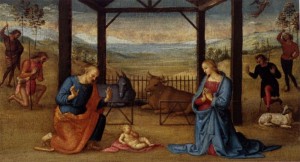
Jesus did not share in any way the DNA of either Mary or Joseph. Otherwise he would have shared in original sin.
A friend of mine asked for my take on this statement from a sermon he heard online. I certainly appreciate why, theologically speaking, one would want to make this kind of distinction in order to clarify Jesus’ relationship to original sin. I also appreciate the effort to engage with a scientific understanding of inheritance. Given the testimony of scripture, I can’t entirely rule out the possibility that this statement is true. Yet I can’t help but wonder if we might want to nuance it a bit more.
What does it mean to share DNA? The human genome can be written out as 3 billion letters, and each person’s letter sequence is likely to be unique to them somewhere along the way. Even identical twins probably have unique mutations that could distinguish them if you read their entire genome sequence. And while children do receive (imperfect) copies of their parents’ DNA, that DNA goes through a mix-and-match process to make a new combination. So a case could be made that no one shares DNA with anyone else, at least not in the same way that you could share a book with someone and each read exactly the same text.
At the same time, any two people will have over 99% of the same letters in the same sequence no matter how distantly related they are. So if Jesus had a recognizably human genome, and it seems reasonable to think that he did, he would have had over 99% of his DNA in common with both Mary and Joseph — and also you and me and everyone you know. In fact, certain cellular processes are so fundamental that humans and bacteria share the same solutions, so Jesus would have shared about 7% of his genes with bacteria. Given that his incarnation brought redemption for all of creation, that seems only fitting to me.
Thus I think the strongest possibility we can entertain is that if we had given Jesus a typical paternity test, neither Mary nor Joseph would come out as his parents. Is that enough for Jesus to escape original sin? I’ve recently discussed original sin and why I don’t think it necessarily has to be inherited biologically, but let’s suppose for now that it is. If Jesus had a recognizably human genome but not the gene for original sin, then essentially that would be a mutation. Even if we suppose the differences did not come about by any usual biological or chemical process, the sequence changes would still look like any other mutation. And that means it would be possible for normal biological or chemical processes to induce the same sequence changes. The possibility for anyone to have a chance to be born without the original sin gene seems like an odd proposition. I can’t completely rule it out, but I personally wouldn’t be comfortable putting many of my theological eggs in that particular basket.
I realize this was a fairly technical meditation on Jesus’ humanity. The incarnation that we celebrate at Christmas is made that much more real for me by digging into these details. I hope they provide something similar for you. And I wish a merry Christmas to you and everyone you celebrate with.
Andy has worn many hats in his life. He knows this is a dreadfully clichéd notion, but since it is also literally true he uses it anyway. Among his current metaphorical hats: husband of one wife, father of two teenagers, reader of science fiction and science fact, enthusiast of contemporary symphonic music, and chief science officer. Previous metaphorical hats include: comp bio postdoc, molecular biology grad student, InterVarsity chapter president (that one came with a literal hat), music store clerk, house painter, and mosquito trapper. Among his more unique literal hats: British bobby, captain’s hats (of varying levels of authenticity) of several specific vessels, a deerstalker from 221B Baker St, and a railroad engineer’s cap. His monthly Science in Review is drawn from his weekly Science Corner posts — Wednesdays, 8am (Eastern) on the Emerging Scholars Network Blog. His book Faith across the Multiverse is available from Hendrickson.

Leave a Reply